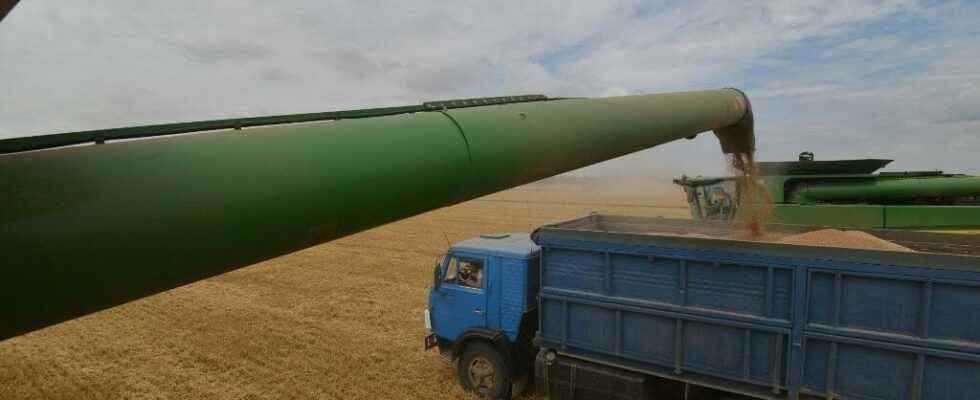The world markets no longer knew on which foot to dance after the decision of the Russian president to recognize the independence of the Ukrainian separatist territories. Oil, metals, wheat or even corn… the prices of raw materials are yo-yoing according to this crisis, the stakes of which are enormous.
The prices of raw materials, in particular those of wheat and corn, are soaring under the threat of a major conflict in Ukraine. Usually much less volatile than the stock market or oil, the agricultural products market is no longer recognizable.
Russia is the world’s largest wheat exporter, exporting 35 million tons over a production of 80 million. For its part, Ukraine is in fourth position. Together, these two countries account for almost a third of world wheat trade (32%). ” Knowing that the United States and Canada have had lower wheat harvests due to the vagaries of the weather, we understand better that this Ukrainian crisis could have a major impact, especially for developing countries. », Estimates Michel Portier, manager of the consulting firm Agritel.
” We need these 35 million tons of Russian wheat to supply the world grain trade “, observes this analyst. ” Of course, we won’t have a lot of logistical problems, especially on the Black Sea where military maneuvers take place. Freight costs are going up. If Russia is not available, and if eventually we have economic sanctions against it, that will only add to the tension. »
Risks of food riots
On the corn side, Ukraine ranks third among exporters with a production of 40 million tonnes. In comparison, France – the leading maize producer in the European Union – only produced 15 million tonnes in 2021.” We will clearly have a problem this year in terms of corn supply on the international scene. », Adds the director of Agritel. ” And who says supply problem, also says rising food prices. Food riots could occur as a result of this conflict, especially in developing countries. »
► To listen and read also: Ukraine, the grain risk
This pressure on prices is also likely to affect the oil market. Correlated to the oil market, oil enters into the composition of biodiesel. “ Sunflower oil is a substitute component compared to palm oil, which is already on the rise due to the climatic incidents that have occurred, particularly in Malaysia. Russia and Ukraine are the world’s two largest producers of sunflower oil. “, explains Michel Portier. So, again, big trouble on the horizon.
On the oil and base metals side, it’s blazing everywhere
While the price of oil is close to 100 dollars, Germany has decided to suspend the authorization of the Nord Stream 2 gas pipeline. For their part, metal prices are soaring. With approximately 4 million tonnes of aluminum produced, Russia is the second largest aluminum producer in the world behind China (37 mln tonnes). World production of aluminum and nickel largely depends on Russian supply. “ The markets have taken on the Ukrainian conflict well. The question that arises is: what will happen in the event of an invasion of the country, but also later? asks Yves Jégourel, professor of university economics in Bordeaux and co-director of the Cercle CyclOpe.
The expert recalls that this renewed tension around Ukraine comes as the global economy recovers from the pandemic. “ There is, of course, a geopolitical danger linked to this conflict. But in the background, there are other issues. An issue of ecological transition, that of macroeconomic recovery, without forgetting the Chinese recovery plan. So the demand is very present. If you add new constraints on supply, we will have prices that will increase in the short and medium term. Then, in the long term, workarounds exist. On natural gas, for example through liquefied gas, with major producing countries such as Australia and Qatar. But a processed product may cost more concludes Yves Jégourel.
The numbers don’t lie
On Euronext, a ton of milling wheat increased by 1.50 euro on the March deadline to 275.50 euros and by 2 euros on the May deadline to 280.75 euros, for some 37,000 lots traded. The ton of corn, for its part, gained 4.25 euros on the March deadline at 261.25 euros, and 3.50 euros on the June deadline at 261 euros, for nearly 1,800 lots traded.
Crude oil prices were also soaring, but they were already very high before the Ukrainian crisis. The price of a barrel of Brent from the North Sea took 2.45% to 97.73 dollars, after touching 99.50 dollars, and that of a barrel of American WTI gained 3.33% to 93.21 dollars.
The ton of aluminum reached $3,380 on the London base metals market (London Metal Exchange, LME), a few cents from its all-time high reached in 2008.
